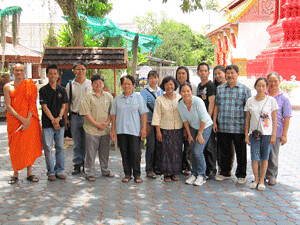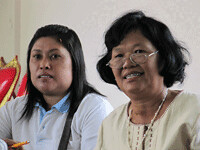Community life competence
Connecting local responses around the world
Connect with us
Website: the-constellation.org
Newsletter English, French Spanish
Facebook https://www.facebook.com/pages/The-Constellation/457271687691239
Twitter @TheConstellati1
Instagram: https://www.instagram.com/constellationclcp/
Volunteers of Papong, like Aunty Paa, give because it makes them happy
 It is 9am. I am sitting in a mini-van heading towards Doi Saket, a district in northern Thailand. Twelve members of ThaiCompetence are excitedly chatting and joking together in the back of the van. For three days, our Thai friends are meeting to share what they have learned in the last three years when applying the SALT approach into their organizations. In the beginning they didn’t know each other. Now, they are good friends and the atmosphere is so relaxed.
It is 9am. I am sitting in a mini-van heading towards Doi Saket, a district in northern Thailand. Twelve members of ThaiCompetence are excitedly chatting and joking together in the back of the van. For three days, our Thai friends are meeting to share what they have learned in the last three years when applying the SALT approach into their organizations. In the beginning they didn’t know each other. Now, they are good friends and the atmosphere is so relaxed.
Khun Ohm tells me: “I took my annual leave from UNESCO to be here. This meeting goes beyond learning, it is about inspiration. It makes me so happy. I’m interested in community work, to learn more about people’s lives and in this way improve what I do.”
We arrive in the temple in Papong sub-district, where a monk and community volunteers welcomes us. We are excited about the visit because Doi Saket is known for its outstanding networking in terms of HIV. The monk starts to explain: “We work in four districts with support from the Global Fund. We monks closely work with the community volunteers. We wear several hats: we give religious teachings, home based care, we manage projects and we give vocational trainings for PLHIV.”

I am struck by the dedication and passion of the volunteers. Aunty Paa is one of them (see lady with the glasses in the picture left): “We support PLHIV in our community. We are there for them, we talk to them, we give them moral support and the purpose of our visits is not to give money. We volunteer because we believe in it! I always give people my mobile phone number and tell them to call me anytime.” Aunty Paa explains that during one project the volunteers received per diem to attend a training. They decided to donate the per diem to the temple.
One visitor asks them why they are volunteers.
- “I feel so proud”, says one lady.
- “If I do good, I know I will be ok. We believe here that ‘a good person will not drown’,” shares Aunty
Paa. “If you know something it is your responsibility to share with others. Even if you don’t have money but you have energy and knowledge you can still share.”
- “It makes me happy and self-confident”, says P. Pratum, a shy lady in the back.
The monk and the volunteers have integrated SALT in their way of working. “When I listen to PLHIV I see they have internal power. They have gone through a lot. We help them to build their self-esteem so that they can use that power.” Aunty Paa says that “we have to apply SALT to ourselves first.”
Aunty Paa also shares about the challenges they face, “I learned to let go. You cannot change people. Sometimes we are concerned about someone, but this person is not taking care of himself. When we fail to reach out to someone we try different entry doors.”
At the end of the visit, Dr. Sompong from UNAIDS asks them if this visit was different from other visits. One of the volunteers says, “During study visits, we tend to give out a created image of our community. Here we shared more about the real situation, including the challenges because there was enough time.” One volunteers said “I was a little scared but when I see your smiles I feel comfortable.”
What I learned from PaPong community is that volunteers dedicate so much time to their community because it makes them happy. I also saw a strong 'community of volunteers' which as an added source of motivation. Volunteers feel like they belong to the group of volunteers, they are proud about it and they support each other within the group.
Comment
-
Comment by Olivia Munoru on June 29, 2010 at 4:37am
-
Wow, what a great experience. I am so encouraged by Khun Ohm, who took annual leave to be there. It challenges me to remember that real community work is not work. It is life. Thanks for sharing!
-
Comment by Laurence Gilliot on June 23, 2010 at 4:52am
-
Message from Usa Duongsaa on Facebook
Thanks for sharing, Laurence. I visited the temple and the volunteers once, and they really are a great team. And the wonderful thing is, INAT has many other teams like that. Kudos to them!
-
Comment by Rituu B. Nanda on June 22, 2010 at 8:41am
-
Dear Laurence,
Thanks for this beautiful blog and the lovely pictures. Volunteers in any programme are priceless, aren't they! ACP especially attracts them in droves as SALT the DNA of the constellation is very energizing and rejuvenating. Recently I was very happy to read that my hometown Chandigarh has the highest number of voluntary blood donations in India. Am yet to figure out the reason!
Aunty Paa reminded me of this quote on volunteerism by Elizabeth Andrew- Volunteers do not necessarily have the time; they just have the heart. I salute to Aunty Paa and all the volunteers.
Rituu
© 2026 Created by Rituu B. Nanda.
Powered by
![]()
You need to be a member of Community life competence to add comments!
Join Community life competence